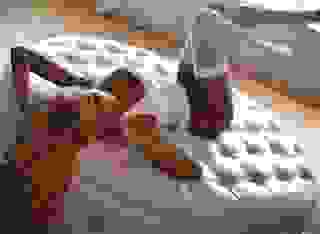- Romance
- A Walk by the Sea
- Page 2
Note: You can change font size, font face, and turn on dark mode by clicking the "A" icon tab in the Story Info Box.
You can temporarily switch back to a Classic Literotica® experience during our ongoing public Beta testing. Please consider leaving feedback on issues you experience or suggest improvements.
Click hereWith that thought he turned from the trail and walked to the edge of the cliff and he looked down at the sea, at endless, colossal waves breaking below, their spray lifting into the air, drifting upward to the sky. He stepped back from the torrent, wiped salt from his eyes as he continued to look out to sea, at the ship pushing against mountainous swells.
Would these storms never end, he asked the wind. Might his winds and waves ever grow still?
She had good days, though rarely, and the voices came for her at odd times. In the middle of the night, like an ebbing tide. Sitting in the car, looking out the window. She would be sitting quietly at a Sunday brunch with friends, then scream as her tormentors returned, warding off blows with her arms to the astonishment of onlookers. In time there were fewer and fewer brunches, and only a few good friends left to share them with, and the weight of her fear overcame him some days.
He saw a coppery glow behind the clouds -- the sun setting, he knew instinctively, and he remembered the girl's hair. Red, a coppery red. A nurse. She had appeared one morning in the exam room, helping with patient histories, taking vitals and drawing blood. She was gorgeous, he remembered, and had a heart of gold, though he soon understood that, too. She was from Maine, Winter Harbor, Maine, from a family of boat builders and he knew that on some level they had been destined to come together. He wasn't all that surprised when it happened, if only because he knew he was all too human. Still, in time only bitterness remained.
Because he had thought this girl different. She was an empath, she'd felt his pain, and when he told her about his wife her first instinct had been to help. She asked to help out on weekends, help him with her meds, help him take care of her, and he'd welcomed that if only because he was blind to more concealed forms of ambition.
The three of them drove north to Downeast Maine one summer weekend, and on that trip they found the land they would at last call their own. His wife walked down to the sea, through a tidy birch forest to the cliffs where she'd looked out over the waves below, and she'd proclaimed her love for him then and there, an eternal love time would never rip asunder. He saw his wife looking at this nurse, wondering, perhaps, when her universe would be pulled from her grasp and their love find an inglorious end, but that was a fiction he would never write.
He found the spot he wanted their new home to rest, and engaged an architect to draw up plans. His nurse approved, of course, and did all she could to show her approval, but the act was wearing thin by that next autumn. The house took shape on summer breezes, and they drove up on weekends, just the two of them. There was a huge, bow-shaped piano room that looked out over the sea, and a new Steinway resided on those mighty oak floors -- pure, unfiltered light pouring through two story windows. She went right to the piano every time she walked in the door, and she played the random notes her disease commanded, the notes of a symphony only she understood.
When he was down to working two days a week he put their house just north of the city on the market, and he found a small condo near the hospital to call his own after they moved to Maine, ostensibly forever. His first night alone in the condo, she, the nurse, came over. She stayed for breakfast, he remembered, then he drove the five hours to their new house on the coast. Lost, in clouds of fiction, perhaps.
He found her on the kitchen floor, sitting in feces, warding off blows that wouldn't stop. He helped her shower then drove her back to the city, and there they would remain for another year. Through another round of anti-psychotics and anti-depressants, until she was lucid and -- just -- ambulatory. This time, he knew, the drive north would be one way.
He had retired, and though he was obligated to teach at the medical school for the next five years he wasn't sure how he would pull that off. He wasn't sure he wanted to anymore. There were mornings he wasn't sure he wanted to wake up, not ever, not again, so he busied himself cutting a trail to the sea, walking with her to the cliffs and eating picnic lunches under the sun. She professed a desire to paint and he guided her along that path; what emerged were howling portraits of madness and despair that left him breathless at the thought anyone might see them.
Of course when her teacher saw her work she loved them and arranged a showing; all of them sold in one weekend and his wife set about producing even darker sketches of pain -- until she couldn't see her way clear of the images in her mind anymore. Her hallucinations had been given a new lease on life in the imagery she conjured, yet too soon they consumed her once again. More months in Boston, another summer shot to hell.
He started teaching that fall, second year students, their clear bright eyes an antidote to the madness waiting at home. He learned he enjoyed teaching by feeling his way through interacting youth, and he occasionally enjoyed casual dalliances with the red headed nurse as well, because he found himself once again wanting more out of life than his wife's howling madness.
He was sitting, alone, in his condo overlooking the Charles one night, wondering if he should sell the new house and move back to the city, put his wife into an assisted living facility -- then quietly divorce her. Perhaps start a new life, have a kid, maybe two. He might be able to pull that off, he thought, then he considered what kind of father he would be. Seventy years old, pushing a three year old in a stroller? Pushing his mid-eighties, if he lived that long, at that child's high school graduation?
No, he said to himself as he laughed out loud, that was folly. He had a wife. He was married to his soulmate and that was that, his cross to...what?
No, she had never been that kind of burden; he had, after all was said and done, loved her from the start. More than that, he had always cherished her, and he would never walk away from all that truly meant.
Or could he? Or...hadn't he...already?
The last few years at the house in Maine had been trying, she was becoming more violent, more withdrawn. Dementia and Alzheimer's were mentioned with more frequency these days, long term inpatient care loomed. Or so he was told.
Perhaps.
But with time had come acceptance. He would take care of her -- until he couldn't. He had been content with that decision, too.
Until this morning.
The violence he'd experienced this day was beyond anything his imagination could produce. The withering verbal assault, the cold fury in her eyes. He had, in her madness, become her tormentor, only this time she had really attacked him. First with her fists, then with a knife, cutting the sleeve of his jacket, or so he thought. When she'd seen blood running down his arm she had screamed in feral agony, fallen to the floor and curled up in a fetal ball. He had dressed his wound with Betadine and Steri-strips, then called her psychiatrist in Boston.
She was a danger now, the woman told him, to herself and others, and that was the end of the line. The time had come.
He looked out the windows as he listened to those words, at the storm gathering along the northeast horizon, at the lightning he saw playing in the distance, and he knew it was time to take a walk by the sea. He carried her to their bed, made sure she had all her meds on board and redressed his wound, then walked through the kitchen and out into the wind.
He heard thunder now, and lightning, still far away but fast closing in.
He looked at the sea one last time and turned for the woods, and home. He passed the stunted pines, walked into blue-shadowed wood -- feeling watched now. He felt fear for the first time in decades, real, visceral fear, the kind he used to feel when he was a kid and he walked into the attic alone.
He stopped, listened. There, in a thick clump of brush beside the brook, a restrained thrashing in dry grass, then silence.
Silence, then a cry. A cry for help.
He walked through tall grass towards the sound, then he stopped again, listening.
Another cry. Pain. Silence.
A few more steps, then...
A fawn in the grass, alone, starving. A broken leg? A coyote perhaps, or a fisher? The animal lifted it's head, looked at him then fell away into fear that had just come calling.
"Oh my," he heard himself say, "what's happened to you?" He approached slowly now, taking off his jacket as he did, until he was beside the animal. He reached out, stroked her head gently, slowly, then he laid his jacket over her shivering body. He continued to stroke her face, her neck, until he thought she might let him pick her up.
She was terrified, wanted to run but all that was behind her now. Her will to live had blown away, on the breeze perhaps. He picked her up, amazed and alarmed at how light she was, how dreadfully vulnerable life was. He carried her like a baby, her chest on his, her face on his shoulder, and he could hear her frantic breath on his neck, her heart hammering against his.
He looked down into her massive eyes as he spoke to her. "It's alright," he said, "I've got you. You're going to be alright now." He picked up his trail, felt the first drops of rain hit his shoulders, and he could see the contours of his roof through the trees ahead.
The crack of thunder overhead caught him off-guard, the lightning not far to his right now close enough to be of some worry, so he picked up his pace, pushed past the few overhanging branches that blocked his way as he closed on the meadow under his house.
The pressure was gentle but insistent, in the center of his chest, the heaviness in his left arm suddenly more than enough to get his attention. He stopped, took a deep breath as he looked into her eyes again, though he could see she was alright now, that fear had left her eyes.
He pushed on. The last of the trees, the grass in need of mowing. The kitchen door, wide open, lights on inside.
She's playing, he said to the fawn. He could hear Chopin coming from her room as he stumbled into the kitchen, sweating now, the feeling of pressure in his chest now impossible to comprehend.
He felt the floor reaching out for him and all he could think about was shielding the fawn from his fall.
Then he is on his side, holding her close to his chest as Debussy fills the air; she is playing again, he says to the fawn, and while she cannot hear them on the kitchen floor he is filled with a kind of joy. The joy he felt on another autumn afternoon, on her prelude to this afternoon.
The next crushing wave leaves him breathless and pale, and he looks into the fawn's eyes, and he sees lingering reflections of helplessness and fear in her eyes. He rubs her face once again as his eyes grow distant and cool, and at last he smiles, when he feels her raspy tongue on his face, and he remembers a pure love as he slips away on the wind.
(C)2016 Adrian Leverkühn | abw
- COMMENTS
A beautiful and compelling love story, beautifully written as though from personal experience. Thank you for weaving this tale. A true five! jntiques
It was romantic, frank, and real.
There is not another author on these pages who can weave words into a story as well as you. Five stars.
I've taken a 'walk by the sea' . . . I'm still doing it. Romance comes in all forms, but always from the heart. This is just such a story. Well done as usual.








